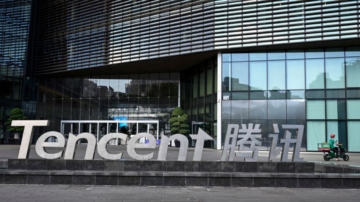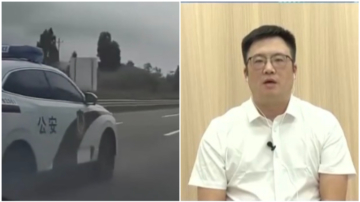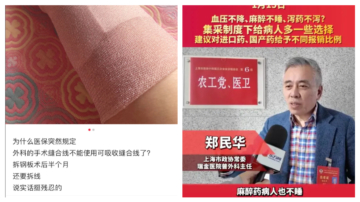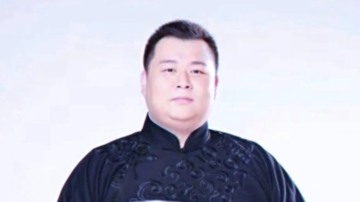【新唐人2013年01月19日讯】去年年末,中共中央经济工作会议,还是把房地产市场调控政策,列为2013年宏观调控政策重点之一。调查发现,近90%的城市居民无力购买住房,而九成以上官员持有数套住房和千万元以上财产。是甚么原因造成了中国房产现状的难解之谜,一起来看看专家的分析。
中共中央研究室及国务院研究室调查显示,北京、天津、上海、杭州、广州、深圳、福州、武汉等副省级干部,95%已持有千万元以上财产,而地局干部,86%属于千万元富翁。
有关调查还指称,虽然调查还只是初步,并不完全,但已经发现80%的公职人员对持有财产有隐瞒或漏报,有的以父母或子女的名义作为业主,甚至以假名或代名持有。
“纽约城市大学”政治学教授夏明指出,中共早期,利用工人和农民从所谓的资本家和地主手中夺取财富,利用工农,不断壮大这些财富,改革中期,又牺牲工人和农民,把这些财富转让到中共官员手中,使他们变成了真正的地主和资本家。
纽约城市大学政治学教授 夏明:“在赚钱、得利的时候,这些权势集团都可以大捞一把,即使在经济危机的时候,他们还是可以捞一把,因为国家政权通过暴力方式把损失。西方国家,经济危机时资本家会自杀、跳楼、欠债、破产,但中国不会这样,他们有国家权力把代价全部转嫁在农民工和工人身上,同时它们可以通过银行来掠夺老百姓的财富。”
国土资源部城乡建设部资料显示,从1998年以来,城市住房,每年以7点8亿平方米的速度兴建。15年兴建住房220亿平方米,不包括原有的各类住房,城市人口人均住房面积达37平方米。按国际城市人均居住面积来评价,已经属于偏上。
不过,中国社会科学院和国务院研究室在38个大中城市调查发现,大城市86%,中等城市84%的居民表示:无法承受和无力购买住房。
夏明:“中国富人福利的改进,是建立在损伤最弱势群体利益的基础上的,这和正义原则正好相违背,正义的体制,应该考虑到最弱势群体他们的利益的改进。同时,利益改进的一个底限是,不能伤害最弱小的、贫穷的群体。”
美国“南卡罗来纳大学”教授谢田指出,共产党把土地所谓国有化,才方便了中共官员们肆意掠夺财富。
美国南卡罗来纳大学教授谢田:“ 现在仍然共产党掌握所有的土地,中国老百姓买房子只能买个使用权。中国根本没有住房的真正销售市场、买卖市场,实际上只是一个租赁的市场。第二,它实行城乡隔离的时候,实际上通过工农产品的(剪刀差)又剥削了中国农民。工人的阶层也是这样,压低工资福利,实行了一个低收入,整体全体贫困这样的方式,来进行管理社会。”
夏明表示,30年的开放,中国老百姓挣脱了农村公社和城市单位,这两大控制体系的绝对束缚,但是他们付出了惊人的代价。因为外出打工,他们被迫远离家庭,亲情和家庭遭到破坏,甚至自己的身体也受到了伤害,典当了自己的未来。
谢田:“清朝的时候,中国的GDP占到全世界的1/4或1/3,现在远远不如清朝时候盛况,人均GDP产值,更是排在世界平均水准以下,远远不如同是中国人的社区像台湾、新加坡还有香港发展的好,这样对比,可以看出中共的谎言是荒谬的。”
谢田还指出,中共的“特权阶层”是伴随中共夺权开始的,从部级、局级、处级,所有的官员都有不同的住房配备,警卫,厨师,司机也都按级别分配。现在中共官员拥有的大量豪宅,是中共所谓的改革开放以来,把权力更加商品化的直接结果。
采访编辑/刘惠 后制/君卓
Chinese Officials Owning Luxury Property Creates Abnormal Real Estate Figures
At the end of last year, the Chinese Communist
Party (CCP) held an economics meeting.
In the meeting, Macro-control policies for controlling
real estate were determined to be important in 2013.
Investigations show that nearly 90% of the urban
population in China had no ability to buy housing.
In contrast, 90% of CCP officials owned several houses
or their properties were worth more than 10 Million RMB.
What are the true facts that caused this
situation in China's real estate today?
Let’s see the expert analysis.
An investigation by the CCP Central Policy Bureau,
and State Council Research Office, showed that
95% of Vice Provincial leaders owned properties
worth more than 10 Million RMB.
86% of Municipality cadres owned
property worth more than 10 Million RMB.
The districts investigated include Beijing, Tianjin, Shanghai,
Hangzhou, Guangzhou, Shenzhen, Fuzhou and Wuhan.
Some preliminary findings suggested
that this wasn’t the whole truth.
It found 80% of public officials lied about their properties.
Some properties nominally belong to their parents
or children, or they may use a pseudonym or nominee.
Xia Ming, Professor of Politics at New York City
University, pointed out that
early in the history of the CCP, it seized and expanded
property from capitalists and landlords, by using workers and peasants.
During the period of reform and opening up, it sacrificed
workers and peasants wealth, transferring it to CCP officials.
This made the officials become
capitalists and landlords.
Xia Ming: “Former landlords and capitalists had
to undertake personal responsibilities and risk.
However, the current officials can seize wealth when there
is a good economic situation, or even in economic crisis.
The reason is that the regime can
control risk through use of violence.
In western countries, when an economic crisis
is approaching, the capitalist will face difficulties.
In China, this does not happen.
The authorities take advantage of power, to
transfer the crisis to the workers and peasants.
They then seize peoples properties through the banks.”
The data from the China Land Source department
showed that from 1998, the speed of building urban
housing was at a rate of 0.78 Billion m2 every year.
Excluding original housing, the average area for
a new urban house has reached 37 square meters.
Compared internationally with areas for houses
for urban populations, this is a much higher area.
However, investigation of 38 large cities by the Chinese
Academy of Social Sciences and the State Council
Research Office showed different values.
It showed that 86% of residents in large cities, and 84%
in medium-sized cities, had no ability to buy housing.
Xia Ming: “Welfare improvement for rich Chinese
is based on damaging the interests of vulnerable groups.
It is unlawful. An upright system should think about
improving the interests of the most vulnerable groups.
Meanwhile, the base-line of improving interests
is not to damage the weakest and poorest groups.”
Xie Tian, a professor from the University of South Carolina,
points out that so-called state land contributes to the CCP
officials being able to wantonly plunder wealth.
Xie Tian: “First, the CCP takes all the land, and the
folks can only buy it by using rights for housing.
In China, there are no real
markets, but only rental markets.
Second, it has separated urban and rural areas.
It has exploited peasants by selling
and buying agricultural products.
With the worker class, it
decreased it's welfare.
It rules the whole society through
lowering income and increasing poverty.”
Xia Ming said that in the 30 years of reform and
opening up, Chinese people broke away from
the shackles of rural communes and urban units.
However, they paid a staggering price.
Migrant workers have to be away from their families.
They sacrifice their marriages, homes and even
their own bodies in order to be able to work.
Xie Tian: “In the Qing dynasty, the Chinese
GDP was 1/4 or 1/3 of the entire world.
Now, it has far less prosperity in
comparison to the Qing dynasty.
The average GDP is ranked below the world average.
It's far less than Chinese districts such
as Taiwan, Singapore and Hong Kong.
So, the lies of the CCP are ridiculous.”
Xie Tian also points out that the privileged
class uphold the CCP to gain their power.
From department level, bureau level and division level,
all the officials can acquire housing, guards, cooks or drivers.
Now, Chinese officials own a large number
of luxury residences,
and this is the direct result of commercialization
of power after the so-called reform and opening up.
中共中央研究室及国务院研究室调查显示,北京、天津、上海、杭州、广州、深圳、福州、武汉等副省级干部,95%已持有千万元以上财产,而地局干部,86%属于千万元富翁。
有关调查还指称,虽然调查还只是初步,并不完全,但已经发现80%的公职人员对持有财产有隐瞒或漏报,有的以父母或子女的名义作为业主,甚至以假名或代名持有。
“纽约城市大学”政治学教授夏明指出,中共早期,利用工人和农民从所谓的资本家和地主手中夺取财富,利用工农,不断壮大这些财富,改革中期,又牺牲工人和农民,把这些财富转让到中共官员手中,使他们变成了真正的地主和资本家。
纽约城市大学政治学教授 夏明:“在赚钱、得利的时候,这些权势集团都可以大捞一把,即使在经济危机的时候,他们还是可以捞一把,因为国家政权通过暴力方式把损失。西方国家,经济危机时资本家会自杀、跳楼、欠债、破产,但中国不会这样,他们有国家权力把代价全部转嫁在农民工和工人身上,同时它们可以通过银行来掠夺老百姓的财富。”
国土资源部城乡建设部资料显示,从1998年以来,城市住房,每年以7点8亿平方米的速度兴建。15年兴建住房220亿平方米,不包括原有的各类住房,城市人口人均住房面积达37平方米。按国际城市人均居住面积来评价,已经属于偏上。
不过,中国社会科学院和国务院研究室在38个大中城市调查发现,大城市86%,中等城市84%的居民表示:无法承受和无力购买住房。
夏明:“中国富人福利的改进,是建立在损伤最弱势群体利益的基础上的,这和正义原则正好相违背,正义的体制,应该考虑到最弱势群体他们的利益的改进。同时,利益改进的一个底限是,不能伤害最弱小的、贫穷的群体。”
美国“南卡罗来纳大学”教授谢田指出,共产党把土地所谓国有化,才方便了中共官员们肆意掠夺财富。
美国南卡罗来纳大学教授谢田:“ 现在仍然共产党掌握所有的土地,中国老百姓买房子只能买个使用权。中国根本没有住房的真正销售市场、买卖市场,实际上只是一个租赁的市场。第二,它实行城乡隔离的时候,实际上通过工农产品的(剪刀差)又剥削了中国农民。工人的阶层也是这样,压低工资福利,实行了一个低收入,整体全体贫困这样的方式,来进行管理社会。”
夏明表示,30年的开放,中国老百姓挣脱了农村公社和城市单位,这两大控制体系的绝对束缚,但是他们付出了惊人的代价。因为外出打工,他们被迫远离家庭,亲情和家庭遭到破坏,甚至自己的身体也受到了伤害,典当了自己的未来。
谢田:“清朝的时候,中国的GDP占到全世界的1/4或1/3,现在远远不如清朝时候盛况,人均GDP产值,更是排在世界平均水准以下,远远不如同是中国人的社区像台湾、新加坡还有香港发展的好,这样对比,可以看出中共的谎言是荒谬的。”
谢田还指出,中共的“特权阶层”是伴随中共夺权开始的,从部级、局级、处级,所有的官员都有不同的住房配备,警卫,厨师,司机也都按级别分配。现在中共官员拥有的大量豪宅,是中共所谓的改革开放以来,把权力更加商品化的直接结果。
采访编辑/刘惠 后制/君卓
Chinese Officials Owning Luxury Property Creates Abnormal Real Estate Figures
At the end of last year, the Chinese Communist
Party (CCP) held an economics meeting.
In the meeting, Macro-control policies for controlling
real estate were determined to be important in 2013.
Investigations show that nearly 90% of the urban
population in China had no ability to buy housing.
In contrast, 90% of CCP officials owned several houses
or their properties were worth more than 10 Million RMB.
What are the true facts that caused this
situation in China's real estate today?
Let’s see the expert analysis.
An investigation by the CCP Central Policy Bureau,
and State Council Research Office, showed that
95% of Vice Provincial leaders owned properties
worth more than 10 Million RMB.
86% of Municipality cadres owned
property worth more than 10 Million RMB.
The districts investigated include Beijing, Tianjin, Shanghai,
Hangzhou, Guangzhou, Shenzhen, Fuzhou and Wuhan.
Some preliminary findings suggested
that this wasn’t the whole truth.
It found 80% of public officials lied about their properties.
Some properties nominally belong to their parents
or children, or they may use a pseudonym or nominee.
Xia Ming, Professor of Politics at New York City
University, pointed out that
early in the history of the CCP, it seized and expanded
property from capitalists and landlords, by using workers and peasants.
During the period of reform and opening up, it sacrificed
workers and peasants wealth, transferring it to CCP officials.
This made the officials become
capitalists and landlords.
Xia Ming: “Former landlords and capitalists had
to undertake personal responsibilities and risk.
However, the current officials can seize wealth when there
is a good economic situation, or even in economic crisis.
The reason is that the regime can
control risk through use of violence.
In western countries, when an economic crisis
is approaching, the capitalist will face difficulties.
In China, this does not happen.
The authorities take advantage of power, to
transfer the crisis to the workers and peasants.
They then seize peoples properties through the banks.”
The data from the China Land Source department
showed that from 1998, the speed of building urban
housing was at a rate of 0.78 Billion m2 every year.
Excluding original housing, the average area for
a new urban house has reached 37 square meters.
Compared internationally with areas for houses
for urban populations, this is a much higher area.
However, investigation of 38 large cities by the Chinese
Academy of Social Sciences and the State Council
Research Office showed different values.
It showed that 86% of residents in large cities, and 84%
in medium-sized cities, had no ability to buy housing.
Xia Ming: “Welfare improvement for rich Chinese
is based on damaging the interests of vulnerable groups.
It is unlawful. An upright system should think about
improving the interests of the most vulnerable groups.
Meanwhile, the base-line of improving interests
is not to damage the weakest and poorest groups.”
Xie Tian, a professor from the University of South Carolina,
points out that so-called state land contributes to the CCP
officials being able to wantonly plunder wealth.
Xie Tian: “First, the CCP takes all the land, and the
folks can only buy it by using rights for housing.
In China, there are no real
markets, but only rental markets.
Second, it has separated urban and rural areas.
It has exploited peasants by selling
and buying agricultural products.
With the worker class, it
decreased it's welfare.
It rules the whole society through
lowering income and increasing poverty.”
Xia Ming said that in the 30 years of reform and
opening up, Chinese people broke away from
the shackles of rural communes and urban units.
However, they paid a staggering price.
Migrant workers have to be away from their families.
They sacrifice their marriages, homes and even
their own bodies in order to be able to work.
Xie Tian: “In the Qing dynasty, the Chinese
GDP was 1/4 or 1/3 of the entire world.
Now, it has far less prosperity in
comparison to the Qing dynasty.
The average GDP is ranked below the world average.
It's far less than Chinese districts such
as Taiwan, Singapore and Hong Kong.
So, the lies of the CCP are ridiculous.”
Xie Tian also points out that the privileged
class uphold the CCP to gain their power.
From department level, bureau level and division level,
all the officials can acquire housing, guards, cooks or drivers.
Now, Chinese officials own a large number
of luxury residences,
and this is the direct result of commercialization
of power after the so-called reform and opening up.








